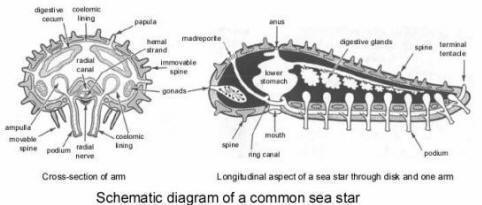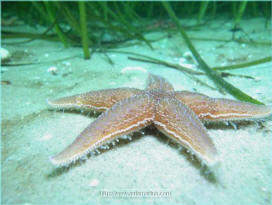
|
|
Water Vascular System |
Though echinoderms have an endoskeleton made of calcium carbonate, the water vascular provides another form of support. The water vascular system is a network of tubes and chambers that conduct water to form a sophisticated hydrostatic skeleton. This system is especially important to the asteroidea because this system is not only used for support but locomotion and eating as well.
 |
|
Photo courtesy of Pierre Madl at http://www.sbg.ac.at/ipk/avstudio/pierofun/planci/planci.htm |
The water vascular system begins at the madreporite, which is a structure that allows water to enter the sea star and is located on the dorsal side of the organism. The water then travels through the stone canal and then into the ring canal. Once the water is in the ring canal, it travels down one of the five radial canals. The radial canal has many muscular sacs called ampulla, which can control the water pressure and allow the podia to extend and contract in a coordinated manner. The podia are able to grab and release from the substrate and this allows the individual to move.
|
|
|
Photo courtesy of Dirk Schories at http://www.guiamarina.com/ |
In addition to attaching to substrate, the podia are used to attach to the sea stars prey. This can be seen very clearly when the sea star is eating a mussel or oyster. The podia allow the sea star to exert a small amount of force and make the small opening in the mollusk's shell to insert its stomach and digest it.
|
|
Sensing its Environment |
Though sea stars may not be able to see their environment, eye spots are located at the tip of each arm. These specialized cells are light sensitive and can detect when it is day or night.
Asterias rubens is also able to recognize food, predators, and other sea stars through a very well developed olfactory sense.
Send questions or comments to richards.mic2@students.uwlax.edu
